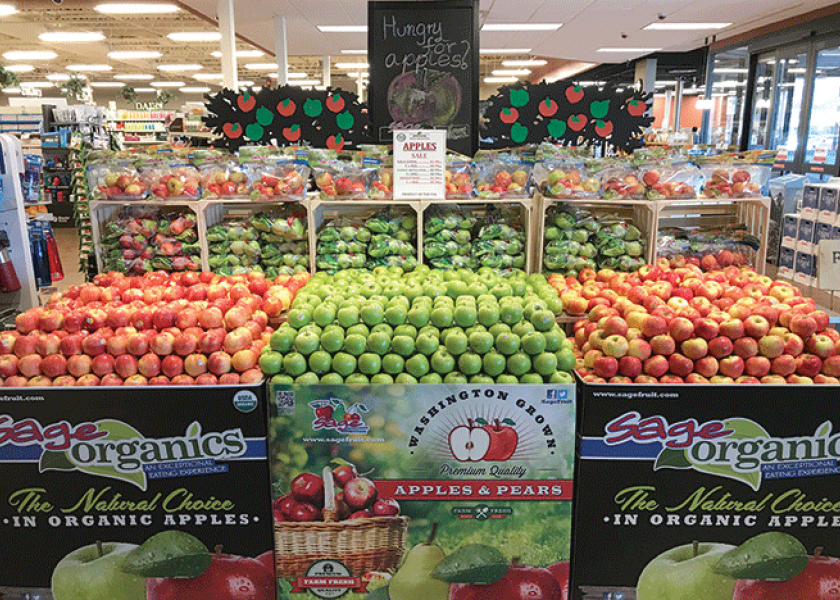Retailers urged to display lots of organic produce

In 2017, organic sales set a new standard in the U.S., and fresh produce played a key role in that achievement, according to the Washington, D.C.-based Organic Trade Association.
U.S. organic sales totaled $49.4 billion in 2017, up 6.4% from 2016 and reflecting new sales of nearly $3.5 billion, according to the OTA’s 2018 Organic Industry Survey.
Fruits and vegetables continued to be the largest organic food category, recording $16.5 billion in sales in 2017 on 5.3% growth. Fresh produce accounted for 90% of organic fruit and vegetable sales.
Organic food accounted for 5.5% of the total market, compared to 5.2% in 2016.
“The popularity of organic produce has prompted retailers to launch products under their own private-label brands,” said Laura Batcha, the OTA’s CEO and executive director.
“Baby spinach, romaine lettuce, spring mixes and arugula are popular. Broccoli and cauliflower also are in demand, with cauliflower rice an example of companies figuring out how to use all parts of a vegetable.”
Ready-to-eat, pre-washed and packaged produce continue to be in high demand, Batcha said.
“More varieties of prepared and pre-cut vegetables, such as cauliflower, peas, broccoli and carrots, make it easier for consumers to get meals on the table, while packaged and prepped items such as zucchini noodles also are now marketed.”
Produce marketers say consumers are demanding not only more organic product but more choices within the category.
Apple grower-shippers say they are offering consumers plenty of choices.
“For us, the demand for organic Honeycrisp is steadily growing,” said Chuck Sinks, president of sales with Yakima, Wash.-based Sage Fruit Co.
Sage Fruit also offers organic red delicious, gala, granny smith and fuji apples, as well as bartlett, anjou and bosc pears, Sinks said.
“In addition, we offer organic packaging pouch bags for each of our commodities and varieties, as well as point-of-sale marketing material,” he said.
Consumers also are clamoring for the newer apple varieties, said Brianna Shales, communications director with Wenatchee, Wash.-based Stemilt Growers LLC.
“This is in response to consumer demand and because of the three-year transition period to organic, takes time to become reality,” she said.
“Shoppers want organic and they want high-flavor varieties like Honeycrisp, fuji, Piñata and Pink Lady. We’re excited to watch these varieties emerge in sales data.”
Shales echoed Sinks in noting that packaging has helped to boost volumes of organics and, in some cases, has allowed retailers “to present a value offering organically” to shoppers.
“We’ve found great success with 3-pound Artisan Organics Lil Snappers pouch bags because of their ability to market to a specific consumer group — parents and their kids,” Shales said.
“Parents want to feed their kids healthy snacks, and this intent package provides them with the right product in a convenient manner to help them do just that.”
The organic category at Vancouver, British Columbia-based The Oppenheimer Group includes apples, berries, cherries, citrus, grapes, greenhouse vegetables, mangoes, kiwifruit and pears, said Chris Ford, organic category manager.
“We experience excellent demand for our imported organic apples, pears and kiwifruit,” Ford said.
Ford said New Zealand-based Zespri, an Oppy partner, has seen demand for its yellow-fleshed SunGold kiwifruit zoom.
“Notably, Zespri packs most of the SunGold in clamshells, which creates excellent merchandising appeal and also an opportunity for consumers to learn more about the new fruit,” Ford said.
Millennials are key drivers of the organic category, said Robert Schueller, director of marketing with Los Angeles-based World Variety Produce.
“If you’re not catering to the largest segment of your business — millennials — then they are shopping at your competitor,” he said.







